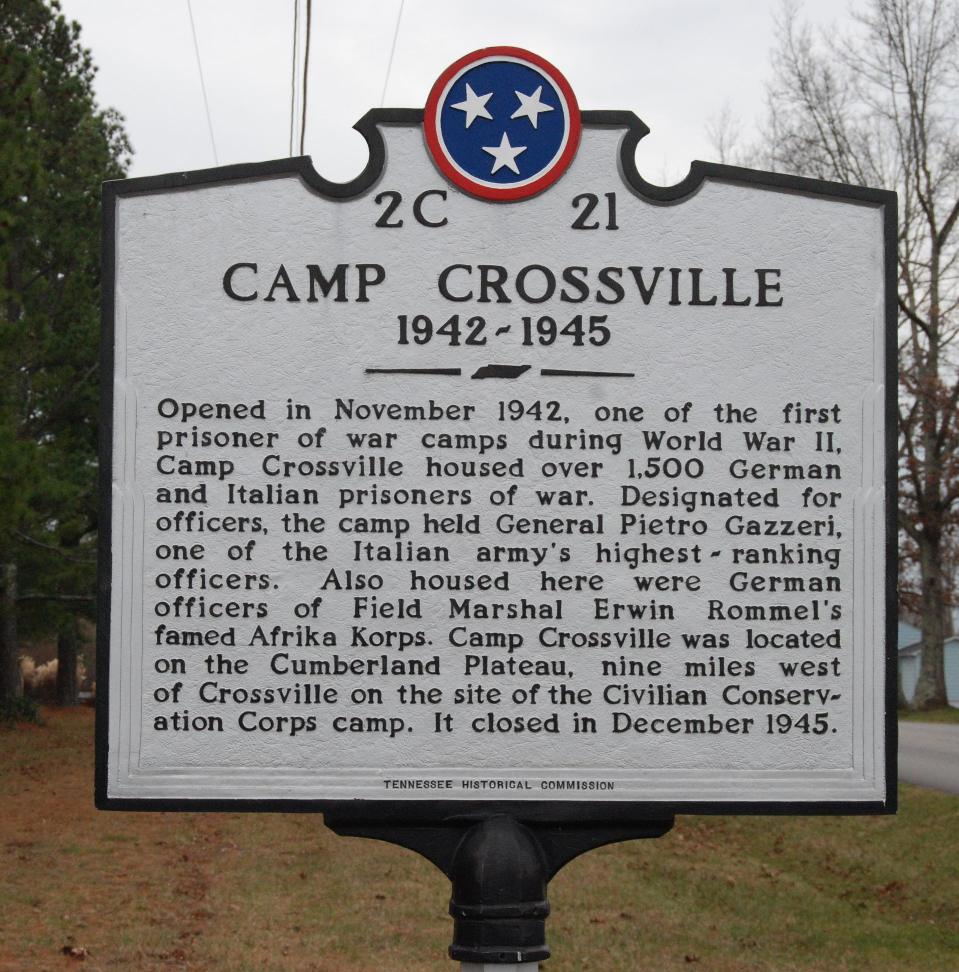 Camp Crossville operated from November 1942 to December 1945. (Contributed photo)
Camp Crossville operated from November 1942 to December 1945. (Contributed photo)
 Camp Crossville operated from November 1942 to December 1945. (Contributed photo)
Camp Crossville operated from November 1942 to December 1945. (Contributed photo)
Read more Chattanooga History Columns
- Gaston: Paul John Kruesi was Edison's right-hand man
- Robbins: The old Richardson's house and the Civil War
- Gaston: James Williams was a man of the world
- Raney: Mason Evans, the 'Wild Man of the Chilhowee'
- Gaston: The legacy of Adolph Ochs endures
- Martin: Ed Johnson said, 'I have a changed heart,' the day before his lynching in Chattanooga on 1906
- Thomas: The inventiveness of Judge Michael M. Allison
- Moore: Chattanooga's first Chinese community
- Summers, Robbins: Chattanooga's Tuskegee Airman - Joseph C. White
- McCallie: The Civil Rights Act of 1964 says so!
- Gaston: John McCline's Civil War - from slave to D.C. parade
- Raney: Exploring Chattanooga businesses in the Green Book
- Elliott: Remembering the Freedmen's Bureau in Chattanooga
- Gaston: Nancy Ward was a beloved, respected Tennessean
- Martin: Prohibition - the noble experiment
- Elliott: 'A shameful, disgraceful deed': The destruction of the Sewanee cornerstone
- Gaston: Robert Cravens was ironmaster, Chattanooga area's first commuter
- Robbins: Dr. T.H. McCallie's Christmas 1863
- Robbins: Journalist writes of a trip to Missionary Ridge in 1896
- Summers, Robbins: Mine 21 disaster - gone but not forgotten
- Elliott: Collegedale incorporates to avoid Sunday 'blue laws'
- Gaston: 'Marse Henry' Watterson's journalism fame began in Chattanooga
- Robbins: Orchard Knob battle recalled in 1895
- Elliott: Chattanoogans joined in an 'orgy of joy and gladness' on Armistice Day, 1918
- Thomas: Noted service, speakers are marks of Rotary Club of Chattanooga since 1914
- Summers and Robbins: Remembering noted Tennessee author North Callahan
- Raney: 'I auto cry, I auto laugh, I auto sign my autograph'
- Gaston: Sequoyah's alphabet enriched Cherokees
- Robbins: A look at Sam Divine's life during the Civil War
- Robbins: Memories of a Confederate nurse
- Robbins: More notes from Bradford Torrey's 1895 visit to Chickamauga Battlefield
- Robbins: Journalist in 1895 details visit to Chickamauga Battlefield
- Elliott: Telephone exchange firebombing was distraction for grocery store robbery
- Gaston: Worcester brought Christ's message to Cherokee at Brainerd Mission
- Robbins: 1896 travel diary: 'A Week on Walden's Ridge'
- Gaston: Elizabeth Strayhorn, WAC Commandant at Fort Oglethorpe
- Robbins: The history of the Friends of Moccasin Bend National Park
- Moore: Do you own a Sears Roebuck home?
- Summers and Robbins: Camp Nathan Bedford Forrest in World War II
- Gaston: Hiram Sanborn Chamberlain remembered
- Elliott: Daisy the center of tile, ceramic manufacturing in Hamilton County
- Gaston: FDR inaugurates the Chickamauga Dam
- Summers, Robbins: Interned WWII Germans had it easy at Camp Crossville
- Elliott: A war correspondent on Lookout Mountain
- Gaston: Chickamaugas finally bury hatchet in Tennessee Valley
- Gaston: Chickamaugas in Chattanooga
- Robbins: The history of the Riverbend festival
- Raney: Sadie Watson, the first woman elected in Hamilton County government
- Moore: Remembering Chattanooga's Hawkinsville community
- Elliott: Welsh coal miners transformed Soddy after the Civil War
- Gaston: Chattanooga's best-kept secret
- Elliott: Cabell Breckinridge loses his horse
- Raney: Martin Fleming is the people's judge
- Gaston: The amazing career of Francis Lynde
- Martin: Hamilton County's Name Sake: Alexander Hamilton
- Summers, Robbins: The crosses at Sewanee
- Bledsoe: The fiery truce at Kennesaw Mountain
- Moore: Talented architect's life cut short by tragedy
- Rydell: Chattanooga's place in soccer history
- Robbins: Tennessee Coal, member of the First Dow Jones Industrial Average
- Raney: In the barber chair
- Lanier: Becoming the Boyce Station Neighborhood Association
- McCallie: John P. Franklin: Living history among us
- Barr: Chattanooga's first railroad: The Underground Railroad
- Summers, Robbins: Charles Bartlett was a Pulitzer Prize winner, Kennedy confidant
- Rainey: 'We have seen it'
- Elliott: Feinting and fighting at Running Water Creek and Johnson's Crook
- Gaston: The Spring Frog Cabin at Audubon Acres
- Raney: Wauhatchie Pike was moonshine motorway
- Robbins: Oakmont was home of venerable Williams clan
- Summers and Robbins: Rebirth of the Mountain Goat Line
- Elliott: Bad investments led to Soddy Bank failure in 1930
- Summers and Robbins: Pearl Harbor attack left football behind
- Gaston: Jolly’s Island namesake had long ties with Sam Houston
- Return Jonathan Meigs, Indian Agent
- Moore: Did you know about St. Elmo's other two cemeteries?
- Summers: Orme - Marion County's almost lost community
- Davis: Spooky revival at Sharp Mountain in 1873
- Robbins: The story of Longholm
- Raney: Women labored to help the U.S. win World War I
- Even in the city, the 'wheel' changed everything
- Murray: Confederate dilemma after Chickamauga
- J.B. Collins — Newsman extraordinaire
- Robbins: The Story of the Lyndhurst Mansion
- Chattanooga artist and wife lost on the Lusitania
- Chattanooga History Column: Battelle, Alabama and the Battelle Institute
- John Ross, a founder of Chattanooga
- Hamilton County casualties in World War I
- Chattanooga Power Couple
- 'Somewhere in France'
- The Ray Moss family
- Battery B from Chattanooga
- Ulysses S. Grant, Clark B. Lagow, and the Chattanooga Bender
- Songbirds Museum Timeline
- Hamilton County World War 1 roster
- The Soddy Girl and the Memphis Belle
- Blues icon Bessie Smith was the Empress of Soul
- Women's Army Corps at Chickamauga
- Emma Bell Miles' life at the top of the 'W'
- The Tivoli Wurlitzer is one of Chattanooga's priceless assets
- Chattanooga in struggle for freedom during Civil War
- October 1918, Chattanooga paralyzed by Spanish flu epidemic
- Eli Lilly and the Ditch of Death
- One hundred years ago, Chattanooga goes to war
- The legacy of Anna Safley Houston
- Harriet Whiteside was ahead of her time
- Southern Adventist University
- Chattanooga native's writings aided Civil Rights movement
- Zion College, Chattanooga's only African American College
- The North Shore's hidden past
- Mayme Martin -- Businesswoman and community leader
- Thomas Sim's epic struggle for freedom
- Top of Cameron Hill was price of rerouting interstate
- Cameron Hill has rich history
- Temperance movement included Harriman university
- The sweetest music this side of Heaven
- Conquistadors at Chattanooga
- Chattanooga and the 'General'
- Chattanooga's first Thanksgiving, 1863
- Chattanooga's greatest flood caught city unaware
- Opening the Cracker Line
- European trip in 1900 enlightens Sophia Scholze Long
- Sophia Scholze Long spoke out when others were silent
- Little South Pittsburg and its big silent movie stars
- Lot attendant recalls hottest job in Chattanooga
- Chattanooga's Forest Hills is final resting place for known, unknown
- Burritt College -- Pioneer of the Cumberlands
- Chattanooga's nicknames trace city's evolution
- The 25th annual meeting of the Tennessee Press Association
- Clemons Brothers Furniture Store
- The Short Life of the USS Chattanooga
- Ellen Jarnagin McCallie lived a truly remarkable life
- Dr. Jonathan Bachman was a revered city father
- Second guessing the Confederate failure on Missionary Ridge
- Nancy Kefauver, ambassador for the arts
- William Gibbs McAdoo kept his Southern roots
- Chattanooga's Secretary of the Treasury
- Howard Baker remembered as a statesman/photographer who snapped history
- Tivoli's last picture show
- The history of one of Chattanooga's oldest businesses
- Chattanooga's roller derby skaters
- Myths of Coca-Cola in Chattanooga
- Chattanooga's neighborhood grocery stores
- The tale of the Scottsboro Boys
- The people's history of Chattanooga
- Howard School is Chattanooga's reminder of Reconstruction
- Elevator operator, painter, mystery man: meet Rice Carothers
- Raulston Schoolfield made enemies amid his rise to power
- Website lets users peer into Chattanooga's past
- The flood of 1917
- Chattanooga's 'wickedest woman' buried at Forest Hills
- History of Cummings Highway
Few Tennesseans know of the 11 prisoner of war camps scattered throughout the Volunteer State during World War II. Camp Forrest near Tullahoma, Camp Campbell near Nashville, Camp Tyson in Henry County, and Camp Crossville in Cumberland County were among the major units.
The site of the Crossville POW camp is now named for the grandson of one of America's greatest World War I military heroes, Alvin C. York. The Clyde York 4-H Center hosts thousands of children who go every year to learn archery, swimming, and teamwork. The long white building was the POW hospital.
Lt. Gerhard G. Hennes, a communications specialist in Field Marshal Erwin Rommel's Afrika Korps, was one of the POWs. The son of a minister in Coblence, he was 17 and working on a crew building bunkers and obstacles on the Siegfried Line along the French border when Germany invaded Poland on Sept. 1, 1939. After participating in Rommel's siege of Tobruk and the battle at El Alamein, Hennes was captured when the field marshal surrendered to the British in Tunisia in May 1943. Crossing the Atlantic on the Queen Mary, the POW ended up in Crossville, a barbed wire-enclosed compound on a wooded plateau in Tennessee.
Instead of bread and water, the prisoners enjoyed breaded pork chops, string beans, corn muffins and Jell-O. "We ate and drank, and played soccer and learned English, yet to the Fatherland, we were lost," he later wrote in a 128-page book, "The Barbed Wire: POW in the USA." Given $20 a month as a lieutenant, he and other prisoners could buy beer, cigarettes, books and other items from the commissary as well as the Sears catalog. They attended classes taught by fellow prisoners, participated in tennis and soccer leagues, played cards and drank beer.
Due to a manpower shortage in the area because of the war, many POWs worked in factories and farms. Prisoners were allowed to leave the camp unescorted. Few attempted to escape because of the favorable conditions. Some believed that Germany would win the war and objected to learning English, thinking that German would be the principal language after the Nazis prevailed.
Around Christmas 1944, Hennes received a post card from a POW camp in Trinidad, Colorado, and learned that his father, a World War I veteran and reserve officer, who had commanded an armored battalion on the Russian front and in Normandy, was transferring to Crossville. "His pervasive mix of faith in the Fatherland, its leader and God seems strange indeed for a man of my father's intelligence and education." News of the death of his brother on the Russian front shook Gerhard Hennes and his father.
On April 20, 1945, the prisoners at Crossville gathered to celebrate Adolf Hitler's 56th birthday. Days later the fuhrer was dead. On May 8, Germany surrendered. Shortly afterwards, the 1,300 German POWs were taken to a darkened movie house. They saw for the first time, mass graves, naked bodies stacked near crematoriums and the empty stares of emancipated survivors of Dachau and Auschwitz. Hennes, the holder of two Iron Crosses, wrote, "That day, when spring was at its most beautiful, was the day I turned from being a hero to being a villain." Prison authorities reduced the quality of food, paid labor and recreation privileges.
Following his release from Crossville, Hennes returned to a devastated Germany and then spent 18 years providing disaster relief to people in 80 countries through Church World Service, a U.S.-based relief, development and refugee assistance ministry. He also served as vice president for administration at the New Brunswick Theological Seminary in New Jersey. An American citizen since 1958, Hennes returned to reside at Fairfield Glade in Crossville.
The Military Memorial Museum at 20 S. Main St., Crossville, Tennessee, houses artifacts and memorabilia about Camp Crossville as well as other items of military history. A large wooden model of Camp Crossville based on sketches and maps of the facility stands out.
Robert Boring, curator of the museum, and his wife Nina, the director, commented: "Camp Crossville specialized in the internment of German officers including 1,500 from Field Marshal Erwin Rommels' North Afrika Korps. We also had 400 Italian officers at the camp but they were transferred to other locations because of the friction between them and the Germans as each side blamed the other for the defeat in the desert."
Jerry Summers is an attorney with Summers, Rodgers and Rufolo. Frank "Mickey" Robbins is an investment adviser with Patten and Patten. For more visit Chattahistoricalassoc.org.


